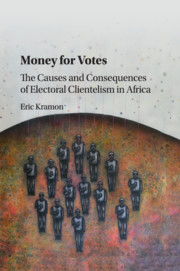Book contents
- Frontmatter
- Contents
- List of Tables
- List of Figures
- Acknowledgments
- Part I The Puzzle of Electoral Clientelism
- Part II Empirical Evidence
- 4 The Mechanics of Electoral Clientelism: Descriptive Evidence
- 5 Why is Electoral Clientelism Effective?: Experimental Evidence
- 6 Who Invests in Electoral Clientelism?: Incumbents versus Challengers
- 7 Electoral Clientelism and Ethnic Politics
- 8 Electoral Clientelism and the Provision of Local Public Goods
- 9 Conclusion
- Appendices
- Bibliography
- Index
8 - Electoral Clientelism and the Provision of Local Public Goods
from Part II - Empirical Evidence
Published online by Cambridge University Press: 26 October 2017
- Frontmatter
- Contents
- List of Tables
- List of Figures
- Acknowledgments
- Part I The Puzzle of Electoral Clientelism
- Part II Empirical Evidence
- 4 The Mechanics of Electoral Clientelism: Descriptive Evidence
- 5 Why is Electoral Clientelism Effective?: Experimental Evidence
- 6 Who Invests in Electoral Clientelism?: Incumbents versus Challengers
- 7 Electoral Clientelism and Ethnic Politics
- 8 Electoral Clientelism and the Provision of Local Public Goods
- 9 Conclusion
- Appendices
- Bibliography
- Index
Summary
Why do politicians hand out money during elections in Kenya? According to a resident of Nairobi, “they insist on this money we are giving you is just a start of the many projects that I will do once you elect me in office … they are trying to show that by givingmoney they will bring better amenities to the people” (Nairobi-02, 2015). “It's a show of development and of concerns to the people,” said a respondent from Kisii (Kisii-02, 2015). A respondent from Kakamega in Western Province explained that “by giving peoplemoney, politicians show that they will in future be able to take good care of their people, provide them with resources, create employment, and improve their living standards” (Kakamega-04, 2015).
This chapter addresses a simple but important question: Are these Kenyans right? I examine this question by investigating the relationship between electoral clientelism and the provision of local public goods in the period following the elections. I address two questions: First, is electoral clientelism associated with lower overall levels of public goods investment in an electoral district? That is, do politicians expend more or less effort and resources providing local public goods in contexts where electoral clientelism is prevalent? Second, do communities within electoral districts that experience more electoral clientelism receive fewer public goods in the period following the campaign? The goal is thus to examine how electoral clientelism relates to the overall provision and distribution of public goods.
In answering these questions, this chapter serves a dual purpose. First, the chapter tests empirical implications of the informational theory advanced in this book. Indeed, the theory produces potentially counter-intuitive implications with respect to the relation between electoral clientelism and public goods provision. If electoral handouts convey information to voters about the future flow of clientelist benefits, then we may observe more local public goods provision by MPs where electoral clientelism is concentrated. These predictions contrast with the notion that clientelism undermines public goods provision and that voters who can be mobilized with handouts during a campaign will be less likely to receive benefits in the future (Hanusch and Keefer, 2013; Kitschelt and Wilkinson, 2007; Stokes, 2007a).
- Type
- Chapter
- Information
- Money for VotesThe Causes and Consequences of Electoral Clientelism in Africa, pp. 161 - 179Publisher: Cambridge University PressPrint publication year: 2017



